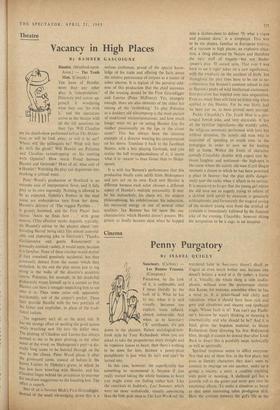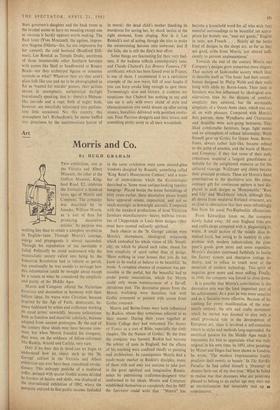Cinema
Penny Purgatory
By ISABEL QUIGLY Sanctuary. (Carlton.) Les Bonnes Femmes. (Compton.)
FAULKNER, by the look of it, is unfilmable, and I mean literally by the look of it. What he has to say, when it is said visually, becomes too explicit, turns inflated, absurd, unbearable. And when, as in Sanctuary ('X' certificate), it's put
down in the plainest, flattest sociological-text- book style by Tony Richardson; when you are asked to take the preposterous story straight and its repulsive lesson to heart, then there's nothing to be done for him, because a penny-plain pamphleteer is just what he isn't and can't be turned into.
In this case, however, the superficiality has something to recommend it, because if you really started taking the whole business to heart you might come out feeling rather sick. Like the cannibals in Suddenly, Last Summer, which were no more realistically, visually convincing than the little pink mice in The Lost Weekend, the murdered baby in Sanctuary doesn't shock or cFsgust or even much bother one, because one doesn't believe a word of it. Or rather, a frame of it. Visually, the whole thing is oldc studio- phonic, without even the picturesque clutter that Kazan, for instance, assembles when he has a mind to. It is poker-faced and chilly and ridiculous. when it should have been rich and gory and circuitous and steamy and (perhaps) tragic. Whose fault is it? You can't say Faulk- ner's, because he wasn't thinking or meaning it cinematically, and why should he be? And it is hard, given the hopeless material, to blame Richardson (here directing his first Hollywood film), though it cannot be denied that after Look Back in Anger this is painfully inept, technically as well as spiritually.
Spiritual ineptness seems to afflict everyone. Not that any of them live, in the first place; but even as literary characters they don't seem to connect, to impinge on one another, make up a group, a society, a story, a credible anything with point or meaning. A sheltered girl has a juvenile roll in the gutter and never gets over its emotional effects. To make a situation as banal as that seem interesting takes prodigious skill. Here the contrast between the girl's life as the State governor's daughter and the back room at the brothel seems to have no meaning except one so obvious it hardly appears worth making. The flash lover (Yves Montand), the ageless, impres- sive Negress (Odetta—far, far too impressive for her context), the cold husband (Bradford Dill- man), Lec Remick as Temple Drake, ancestress of those innumerable other Southerrr heroines with names like Shell or Sandlewood or Rosary Beads—are they archetypal figures or nonsense symbols or what? Whatever they are they aren't plain folk like you and me to be photographed as flat as 'wanted for murder' posters, their actions shown in unemphatic, unrhetorical daylight (emotionally speaking, that is: there's a Mabuse- like car-ride and a rape, both at night; both, however, are mercifully telescoped into perfunc- tory little occasions). No, this country, this atmosphere isn't Richardson's, he seems baffled into dreariness by the sanctimonious horror of its moral: the dead child's mother thanking its murderess for saving her, by shock tactics at the right moment, from eloping. Nor is it Lee Remick's sort of acting, though she tries to make the uninteresting heroine into someone; and if she fails, she is still the film's best effort.
Some things are fascinating for their very bad- ness, if the badness reflects contemporary taste, and Claude Chabrol's Les Bonnes Femmes ('X' certificate), which has been fussed over in France, is one of them. I recommend it as a caricature example of the new wave, full of sour laughs if you can keep awake long enough to spot them. Tormentingly slow and literary, it confirms my suspicions that Chabrol has nothing to say and can say it only with every cliché of style and characterisation you could dream up after eating oysters, banalities delivered with pointless exotic- ism. Four Parisian shopgirls and their lovers, and something pretty nasty in all their woodsheds.















































 Previous page
Previous page